Tajikistan’s 2030 Development Strategy: Goals and Objectives
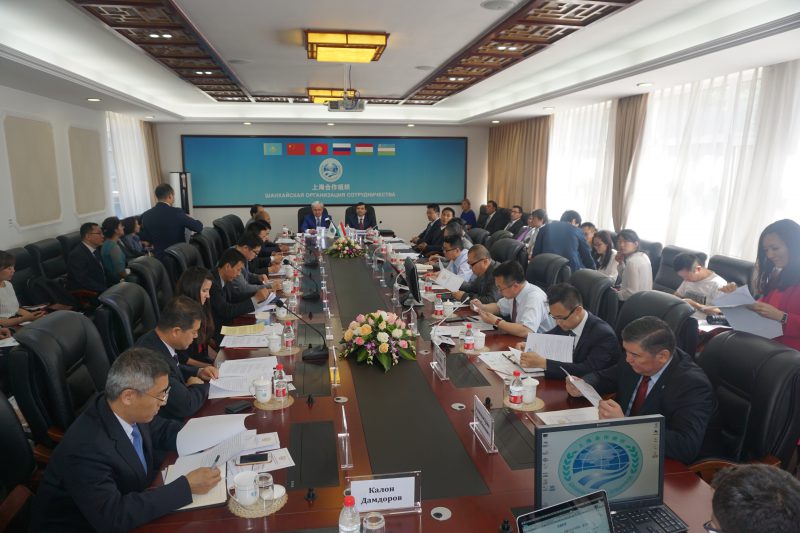
National Development Strategy of Tajikistan for the Period to 2030 presented at SCO headquarters.
According to the SCO’s official website, a roundtable dedicated to Tajikistan’s National Development Strategy for the Period to 2030 took place at the SCO headquarters on May 24.
The event was attended by senior officials from Chinese ministries and agencies, management and researchers from Chinese research institutions, representatives of the diplomatic corps and the media, SCO Secretariat’s officials and representatives from Chinese companies that are cooperating with and are contributing to the development of Tajikistan.
SCO Secretary-General Rashid Alimov said in his opening remarks that “Tajikistan today is a dynamically developing country, and the adoption of this strategic document will mark the way for its continued development.” Mr Alimov also pointed out that “since its independence, Tajikistan has implemented several projects of strategic importance for the nation and foreign policy initiatives in all spheres of life under the wise guidance of the Founder of Peace and National Unity, Leader of the Nation, President of the Republic of Tajikistan, His Excellency Emomali Rahmon.”
The SCO Secretary-General also drew the attention of the roundtable participants to the fact that Tajikistan’s current sustainable development was preceded by a period of serious upheavals, which weighed down on the courageous people of Tajikistan. “Due to the internal Tajik conflict, which was provoked by external forces, Tajikistan’s starting position was the worst among the other Central Asian nations. Despite this, the wise Tajik people have protected their independence and sovereignty, have weathered the consequences of the trying domestic conflict and have regained the respect and trust of the Commonwealth of Nations,” Rashid Alimov said.
The key element of the roundtable’s agenda was the presentation of Tajikistan’s National Development Strategy for the Period up to 2030 by Ambassador of Tajikistan to China Parviz Davlatzoda.
He welcomed the participants as the “true friends and partners of Tajikistan for whom the strengthening of friendship and cooperation is part of their professional career and personal life.” The Ambassador conveyed the Tajik government’s gratitude to researchers, activists and industry and business leaders for their special contribution to the development of Tajik-Chinese relations.
Parviz Davlatzoda pointed out that the National Development Strategy for the Period up to 2030 was prepared with support from the Tajik ministries and agencies, academics and development partners, as well as civil society. “This strategic document will provide the basis for achieving the key development goals through enhancing the concerned agencies’ responsibility for improving the existing system of dialogue between the state and private sectors. The main elements of this strategy are the strengthening of institutional development, effective control, transparency and governance in combating corruption and financial instruments at all levels of government,” the Ambassador said.
Mr Davlatzoda said that the Tajik Government had outlined four strategic development goals that are crucial for achieving the strategy’s priorities and goals by 2030. “The first priority is energy security and energy efficiency. The second goal is to overcome the communication deadlock and turn Tajikistan into a transit country. The third is to achieve food security and ensure public access to quality food and the fourth priority is to increase employment,” the Ambassador said. He added that “the country is facing three tasks at this stage in its development: to attain a level of socioeconomic development comparable to that of middle income countries; to maintain sustainable development through economic diversification and competitiveness; and to expand and strengthen the national middle class.”
Representatives from the Chinese research and business communities speaking at the roundtable discussion said that despite the negative trends in the global economy, Tajikistan has been reporting relatively high economic growth rates and is implementing effective structural reforms. They praised the comprehensive measures taken by the Tajik Government to reduce the influence of external economic upheavals on the national economy.
Researchers and experts also presented their views on the development of Tajikistan and the possibility of deepening Tajik-Chinese ties in the middle term.
The participants showed considerable interest in the presentation of joint projects that are being implemented in Tajikistan jointly with Chinese companies, such as China Global, TBEA, China Road and Bridge Construction, China Railway 19th Bureau Group, CNG, which is implementing the Pakrut gold project and Huawei and CNPC.
Summing up the results of the roundtable discussions, Ambassador Davlatzoda said that Tajikistan has good prospects for development and prosperity. “The republic has rich resources, including human capital, a young and growing population, agricultural, mining and hydroelectric resources, beautiful landscapes and proximity to large markets in the North, the South and also the East. We are ready to cooperate with all our neighbours, friends and partners to open up this potential and improve the quality of life in the country,” he said.
The agenda also included several side events, such as a book exhibition in the new Dushanbe Room of the SCO Secretariat, a photo exhibition of Chinese companies’ cooperation with Tajikistan in the Beijing and Moscow rooms, and the presentation of traditional Tajik cuisine.











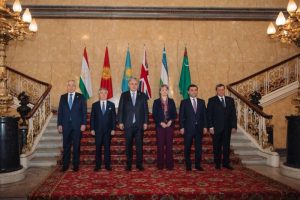 Central Asia, U.K. Hold First C5+1 Foreign Ministers Meeting in London
Central Asia, U.K. Hold First C5+1 Foreign Ministers Meeting in London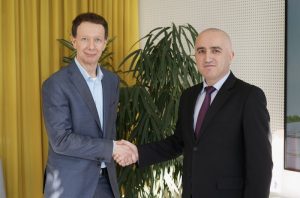 Tajik Ambassador Meets With Wien Energie Chief to Discuss Energy Cooperation
Tajik Ambassador Meets With Wien Energie Chief to Discuss Energy Cooperation Political Consultations Between the Republic of Tajikistan and the United Kingdom Held in London
Political Consultations Between the Republic of Tajikistan and the United Kingdom Held in London Tajik Foreign Minister Participates in Central Asia–UK Parliamentary Dialogue
Tajik Foreign Minister Participates in Central Asia–UK Parliamentary Dialogue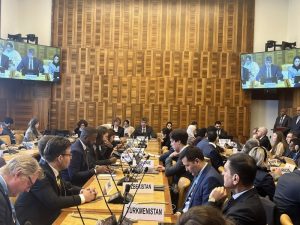 Tajikistan, Qatar host UN side event on digital development and human rights
Tajikistan, Qatar host UN side event on digital development and human rights Tajik Ambassador, Georgian Speaker Discuss Expanding Interparliamentary Cooperation
Tajik Ambassador, Georgian Speaker Discuss Expanding Interparliamentary Cooperation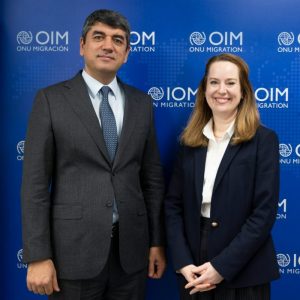 Tajikistan and IOM Discuss Migration Cooperation
Tajikistan and IOM Discuss Migration Cooperation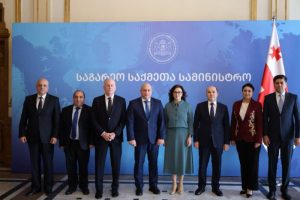 Tajikistan and Georgia Hold Deputy Minister-Level Political Consultations in Tbilisi
Tajikistan and Georgia Hold Deputy Minister-Level Political Consultations in Tbilisi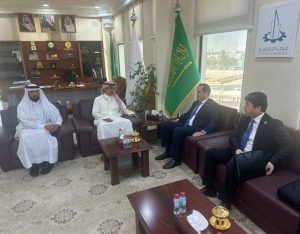 Tajikistan and Saudi Arabia’s Qassim Region Move to Deepen Private Sector Ties
Tajikistan and Saudi Arabia’s Qassim Region Move to Deepen Private Sector Ties Tajikistan and Austria Review Cooperation Plan for 2026
Tajikistan and Austria Review Cooperation Plan for 2026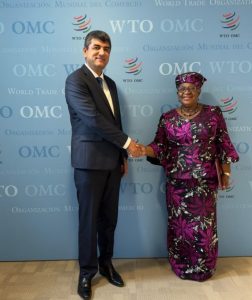 Tajikistan Discusses WTO Commitments and Ministerial Conference Preparations
Tajikistan Discusses WTO Commitments and Ministerial Conference Preparations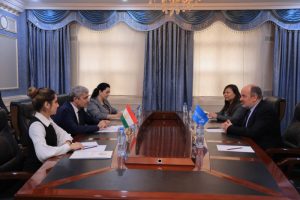 Tajikistan, UNICEF Review Joint Programs on Child and Youth Development
Tajikistan, UNICEF Review Joint Programs on Child and Youth Development














